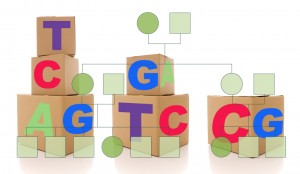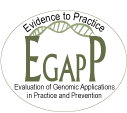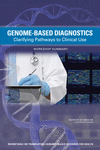Categories: evidence-based medicine, family history, genomics, public health
October 3rd, 2012 11:07 am ET -
Scott Bowen, Office of Public Health Genomics, Centers For Disease Control and Prevention
Karen Greendale, Office of Public Health Genomics, Centers For Disease Control and Prevention
A Working Meeting and an Action Plan
to Save Lives Now
Nearly 2 million Americans are affected by one of three genetic conditions with a strong risk of early morbidity and mortality: BRCA 1/2 and hereditary breast and ovarian cancer; Lynch syndrome and colorectal , endometrial and ovarian cancer; and familial hypercholesterolemia and early cardiovascular events. At present these conditions are poorly identified by the healthcare system but evidence based recommendations are available to prevent disease and improve health.

Opening speaker, Dr. Ursula Bauer Director, NCCDPHP discusses a point later in the day with Dr. Khoury, OPHG Director
On September 7, 2012, eighty experts and stakeholders representing federal, state and local public health agencies, clinicians, key advocates and community leaders came together at CDC’s Roybal headquarters in Atlanta to develop a plan to use evidence based “Tier I” interventions to reduce morbidity and mortality from these three conditions. The event was organized by the CDC Office of Public Health Genomics (OPHG) with help from the University of Michigan Center for Public Health and Community Genomics, Genetic Alliance, and a multi-disciplinary planning committee. The full meeting report is published on the Genomics Forum website and is available for download at http://genomicsforum.org/editoruploads/ActionstoSaveLivesNowReport.pdf
 2 Comments -
Read more
2 Comments -
Read more

Categories: evidence-based medicine, family history, genomics
September 27th, 2012 12:03 pm ET -
Katherine Kolor, Office of Public Health Genomics, Centers for Disease Control and Prevention
Muin J Khoury, Director, Office of Public Health Genomics, Centers for Disease Control and Prevention
 A new podcast from the CDC Expert Commentary Series on Medscape—Family Health History: Use It to Inform Preventive Services for Your Patients— describes how family health history can inform the delivery of preventive health services. The podcast presents three case studies based on recommendations of the US Preventive Services Task Force (USPSTF): screening for lipid disorders in adults, colorectal cancer screening, and BRCA genetic counseling and evaluation. Each case study demonstrates how family health history can be used to define a population subgroup whose increased risk could warrant more intensive preventive intervention. Family health history—which reflects the effects of genetic and environmental risk factors shared within families—has been called the “first genetic test.”
A new podcast from the CDC Expert Commentary Series on Medscape—Family Health History: Use It to Inform Preventive Services for Your Patients— describes how family health history can inform the delivery of preventive health services. The podcast presents three case studies based on recommendations of the US Preventive Services Task Force (USPSTF): screening for lipid disorders in adults, colorectal cancer screening, and BRCA genetic counseling and evaluation. Each case study demonstrates how family health history can be used to define a population subgroup whose increased risk could warrant more intensive preventive intervention. Family health history—which reflects the effects of genetic and environmental risk factors shared within families—has been called the “first genetic test.”
 Post a Comment -
Read more
Post a Comment -
Read more

Categories: evidence-based medicine, genomics
September 20th, 2012 1:12 pm ET -
W. David Dotson, Office of Public Health Genomics, Centers for Disease Control and Prevention
Michael P. Douglas, Office of Public Health Genomics, Centers for Disease Control and Prevention
 The independent EGAPP working group (EWG) held its 25th meeting on September 10-11, 2012 at the CDC campus in Atlanta. Highlights included:
The independent EGAPP working group (EWG) held its 25th meeting on September 10-11, 2012 at the CDC campus in Atlanta. Highlights included:
- Three EWG recommendation statements on the validity and utility of genetic tests are pending publication on:
- KRAS, BRAF and other markers involved in EGFR signaling, which are used to inform choice of therapies for metastatic colorectal cancer, recently submitted to Genetics in Medicine;
- Risk assessment for type 2 diabetes, in pre-submission peer-review; and
- SNP panels for prostate cancer risk assessment (based on a recently completed evidence review by investigators at the McMaster University AHRQ Evidence-based Practice Center), currently being finalized.
- The Knowledge Synthesis Center (KSC) will conduct systematic reviews on familial hypercholesterolemia and colorectal cancer screening – the latter topic is being done in conjunction with modeling by NCI/CISNET .
- The KSC is developing a manuscript for publication on methods and considerations for “binning findings from whole genome sequencing”.
 Post a Comment -
Read more
Post a Comment -
Read more

Categories: evidence-based medicine, genomics
August 23rd, 2012 2:53 pm ET -
Michael P. Douglas, Office of Public Health Genomics, Centers for Disease Control and Prevention
W. David Dotson, Office of Public Health Genomics, Centers for Disease Control and Prevention
 In a previous blog, CDC’s Office of Public Health Genomics announced a list of health-related genomic tests and applications, stratified into three tiers according to the availability of scientific evidence and evidence-based recommendations as a result of systematic reviews. The list is intended to promote information exchange and dialogue among researchers, providers, policy makers, and the public. We have updated the list to include tests that have been discussed in a recent article by the National Comprehensive Cancer Network (NCCN). For these tests, we have considered NCCN recommendations and other evidence-based reviews, reports or assessments from Blue Cross Blue Shield Association Technical Evaluation Center (TEC) and guidelines from the National Institute for Health and Clinical Excellence in the placement of individual tests within the OPHG tier list.
In a previous blog, CDC’s Office of Public Health Genomics announced a list of health-related genomic tests and applications, stratified into three tiers according to the availability of scientific evidence and evidence-based recommendations as a result of systematic reviews. The list is intended to promote information exchange and dialogue among researchers, providers, policy makers, and the public. We have updated the list to include tests that have been discussed in a recent article by the National Comprehensive Cancer Network (NCCN). For these tests, we have considered NCCN recommendations and other evidence-based reviews, reports or assessments from Blue Cross Blue Shield Association Technical Evaluation Center (TEC) and guidelines from the National Institute for Health and Clinical Excellence in the placement of individual tests within the OPHG tier list.
 1 Comment -
Read more
1 Comment -
Read more

Categories: evidence-based medicine, genomics
May 24th, 2012 11:57 am ET -
W. David Dotson, Office of Public Health Genomics, Centers for Disease Control and Prevention
Michael P. Douglas, Office of Public Health Genomics, Centers for Disease Control and Prevention
Synopsis of the 24th Meeting of the Evaluation of Genomic Applications in Practice and Prevention (EGAPP) Working Group

The EGAPP working group (EWG) has held 24 meetings in the 7 years since they were first convened; the latest EGAPP meeting was May 7-8, 2012 on the campus of CDC in Atlanta. Since it is often difficult for interested parties to attend EGAPP meetings, either due to travel or scheduling reasons, we have decided to institute a regular blog to follow each of these meetings which we hope will keep you up to date on what and how EGAPP is doing.
 Post a Comment -
Read more
Post a Comment -
Read more

Categories: EGAPP, evidence-based medicine, genomics
March 28th, 2012 2:15 pm ET -
Michael P. Douglas, Office of Public Health Genomics, Centers for Disease Control and Prevention
W. David Dotson, Office of Public Health Genomics, Centers for Disease Control and Prevention
 A new IOM report makes recommendations that aim to ensure that progress in omics-based test development is grounded in sound scientific evidence and is reproducible, resulting in improved health care and continued public trust in research. Another new IOM roundtable workshop report discussed the differences in evidence required for clinical use, regulatory oversight, guideline inclusion, coverage, and reimbursement of genomic diagnostic tests and focused on ways to clarify pathways for using such tests in clinical settings. Recently, the NIH made a beta version of Genetic Test Registry (GTR) available online. The GTR provides a central location for voluntary submission of genetic test information by developers. The GTR includes information on the test’s purpose, methodology, validity, evidence of the test’s usefulness, and laboratory contacts and credentials. The
A new IOM report makes recommendations that aim to ensure that progress in omics-based test development is grounded in sound scientific evidence and is reproducible, resulting in improved health care and continued public trust in research. Another new IOM roundtable workshop report discussed the differences in evidence required for clinical use, regulatory oversight, guideline inclusion, coverage, and reimbursement of genomic diagnostic tests and focused on ways to clarify pathways for using such tests in clinical settings. Recently, the NIH made a beta version of Genetic Test Registry (GTR) available online. The GTR provides a central location for voluntary submission of genetic test information by developers. The GTR includes information on the test’s purpose, methodology, validity, evidence of the test’s usefulness, and laboratory contacts and credentials. The information provided is not verified by NIH, but assumed to be accurate by the submitting party. The GTR will not obviate the need for evidence-based evaluation of genetic tests and development of recommendations. However it is on track towards becoming useful to advance research and clinical practice.
information provided is not verified by NIH, but assumed to be accurate by the submitting party. The GTR will not obviate the need for evidence-based evaluation of genetic tests and development of recommendations. However it is on track towards becoming useful to advance research and clinical practice.
 1 Comment -
Read more
1 Comment -
Read more








